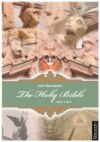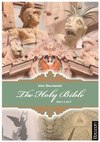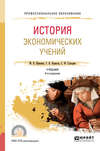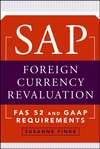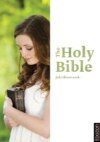Loe raamatut: «Holy Bible (Part 1/2)»
THE
HOLY BIBLE
» The New Covenant & New Testament «
&
» The Book of Daniel « & » The Book of Psalms «
Part 1 of 2
John Biermanski
Ebozon Publishing
First edition July 2016
Copyright © 2016 by Ebozon Publishing
a brand of CONDURIS UG (haftungsbeschränkt)
www.ebozon-verlag.com
All rights reserved.
Cover design by Lisa Seibt
Kuckkuck Fotografie & Design
Book design/layout/coversion by Ebozon Publishing
ISBN 978-3-95963-271-3 (PDF)
ISBN 978-3-95963-269-0 (ePUB)
ISBN 978-3-95963-270-6 (Mobipocket)
All rights reserved in all media. No part of this book may be reproduced or transmitted in any form by any means, electronic or mechanical (including but not limited to: the internet, photocopying, recoding or by any information storage and retrieval system), without prior permission in writing from the author and/or publisher.
My dear families in Brazil
In the name of Yahshua the Messiah (Jesus Christ), the Son of Elohim (G-d): Thank you very much for the image on the cover of this “Holy Bible”. YAHWEH bless you all!
“But as many as received him (Yahshua the Messiah), to them gave he power to become children of YAHWEH, even to them that believe on his name!”
John 1:12
“And if children, then heirs; heirs of YAHWEH, and joint-heirs with the Messiah; if so be that we suffer with him, that we may be also glorified together.”
Romans 8:17
“For you are all the children of Elohim (G-d) by faith in the Messiah Yahshua!”
Galatians 3:26
“For this cause I bow my knees to the Father {YAHWEH} of our Master Yahshua the Messiah, which is the right Father about everything, what there is named children in heaven and on earth!”
“Let no man deceive you with vain words: for because of these things comes the wrath of YAHWEH upon the children of disobedience!”
Ephesians 3:14-15; Ephesians 5:6
“Behold, what manner of love the Father has bestowed upon us, that we should be called children of Elohim (G-d); and we are! Therefore the world knows us not, because it knew him not.”
“By this we know that we love the children of Elohim (G-d), when we love YAHWEH, and keep his commandments.
For this is the love of YAHWEH, that we keep his commandments: and his commandments are not grievous.
For whatever is born of YAHWEH overcomes the world: and this is the victory that overcomes the world, EVEN OUR FAITH.”
1 John 3:1; 1 John 5:2-4
~ ~
This book is written for the glorification
of his holy name.

~ ~ Tetragramm/ Tetragrammaton: ~ ~
{JAHWEH} YAHWEH
THE SACRED SCRIPTURES
"The Holy Scripture shall be accepted as
an authoritative, infallible revelation
of God's will.
It is the benchmark for all doctrines and for the
character: the enunciator of principles,
the touchstone of experience.
The Bible and the Bible alone should be our
basis of faith, the only bond of unity.
God's word is infallible!
Hold the banner high, on which the Bible
is written, our faith and education scale."
Ellen G. White
~ ~ ~ ~ ~ ~ ~
The seal of ELOHIM (G-d) can be found in the fourth commandment of the Ten Commandment, the Sabbath commandment:
His name is “YAHWEH”,
His territorial dominion is “Heaven and Earth”
and His title is “Creator”.
If the seal is removed
from the fourth commandment of ELOHIM,
the whole law then becomes invalid!
~ ~ ~ ~ ~ ~ ~
The Bible.
Its Origin, History, and Place in the World.
The Bible contains proof in itself of its divine origin. No other book can answer the questionings of the mind or satisfy the longings of the heart as does the Bible. It is adapted to every age and condition of life, and is full of that knowledge which enlightens the mind and sanctifies the soul.
In the Bible we have a revelation of the living God. Received by faith, it has power to transform the life. During all its history a divine watch-care has been over it, and preserved it for the world.
How, When, and Why Written?
After the flood, as men became numerous, and darkness was again settling over the world, holy men wrote as they were moved by the Spirit of God. Thus God spoke to His people, and through them to the world, that a knowledge of God and of His will might not perish from the earth.
For centuries this work went on, until the Messiah, the promised Seed, came. With Him, and the blessed message of light and salvation proclaimed by Him and by His apostles, the Scripture record closed, and the Word of God was complete.
Printing and the Bible.
Printing, however, being yet unknown, copies of the Bible could be produced only by the slow, laborious, and expensive process of handwriting. Tnhis necessarily greatly limited its circulation. Worse still, its illuminating and saving truths were largely hidden for centuries by the errors, superstitions, and apostasy of the dark ages. During this time the common people knew little of its contents.
But with the invention of the art of printing about the middle of the fifteenth century, and with the dawn of the reat Reformation in the century following, the Bible entered upon a new era, preparatory to the final proclamation of the gospel [good tidings] throughout the world.
The Bible in Native Tongues.
Thus far, however, the Bible had been published only in ancient tongues, now little understood by the common people [in Aramaic, {in Greek} and in Latin]. Without the Word of God in their hands, the good seed sown among them was easily destroyed. "O", said the advocates of its pure teachings, "if the people only had the Word of God in their own language, this would not happen! Without this it will be impossible to establish the laity in the truth [But Satan hate the Bible and all reader of the common people: The Bible brings light in Satan's dark and deceitful working method.]."
And why should they not have it in their own tongue? they reasoned. Moses wrote in the language of the people of his time; the prophets spoke in the tongue familiar to the men whom they addressed; and the New Testament was written in the language then current throughout the Roman world.
The translation of the Bible into English by John Wyclif, in 1380, was the chief event in the beginning of the Reformation. It also prepared the way for the revival of Christianity in England, and the multiplying there of the Word by the millions, for all the world, that has followed.
To make such a translation at that time, says Neander, "required a bold spirit which no danger could appal." For making it Wyclif was attacked from various quarters, because, it was claimed, "he was introducing among the multitude a book reserved exclusively for the use of priests." In the general denunciation it was declared that "thus was the gospel [good tidings] by him laid more open to the laity, and to women who could read, than it had formerly been to the most learned of the clergy; and in this way the gospel [the good tidings] pearl is cast abroad, and trodden underfoot of swine." In the preface to his translation, Wyclif exhorted all the people to read the Scriptures.
A sense of awe and a thrill of joy filled the heart of the great German Reformer, when, at the age of twenty, while examining the volumes in the library of the university of Erfurt, he held in his hands, for the first time in his life, a complete copy of the Bible. "O God," he murmured, "could I but have one of these books, I would ask no other treasure." A little later he found in a convent a chained Bible. To this he had constant recourse.
But all these Bibles here, as elsewhere, save in England were in an ancient tongue, and could be read only by the educated. Why, thought Luther, should the living Word be confined to dead languages? Like Wyclif, therefore, he resolved to give his countrymen the Bible in their own tongue. This he did, the New Testament in 1522, and the Bible complete, the crowning work of his life, in 1534.
Impressed with the idea that the people should read the Scriptures in their mother tongue, William Tyndale, likewise, in 1525, gave to the English his translation of the New Testament, and later, of portions of the Old Testament Scriptures. His ardent desire that they should know the Bible was well expressed in the statement that if God spared his life he would cause the boy that drives the plow to know more of the Scriptures than was commonly known by the divines of his day [and also more to our time: the 21st century!].
The first complete printed English Bible was that of Miles Coverdale, printed at Zurich, Switzerland, in 1535. Matthew's Bible, Taverner's Bible, and The Great Bible prepared at the suggestion of Thomas Cromwell, Earl of Essex, appeared soon after. Thus the light of truth began to shine forth once more; but not without opposition.
Burning of Bibles.
As Jehoiakim, king of Judah, and the princes under King Zedekiah showed their contempt for God by burning the writings of Jeremiah, and confining the prophet in a dungeon (Jer. 36:20-23; 38:1-6), so now men sought to stem the rising tide of reform by burning the Bible and its translators.
Bible burning was inaugurated in England by the destruction of copies of the Antwerp edition of Tyndale's New Testament, at St. Paul's Cross, London, in 1527, followed by the burning of a second edition in 1530. A little later there were wholesale burnings of the writings and translations of Wyclif, Tyndale, Basil, Barnes, Coverdale, and others.
Forty-three years after the death of Wyclif, or in A. D. 1428, by order of the Council of Constance his bones were dug up and burned. Oct. 6, 1536, by order of Charles V of Germany, Tyndale was strangled and burned at the stake at Vilvorde, near Brussels. "If Luther will not retract," wrote Henry VIII of England, "let himself and his writings be committed to the flames."
Such, under the spiritual tyranny that ruled in those times, was the fate of many who stood for [the true] God and His [Holy] Word.
The Word Not Bound.
But the Word of God could not be forever bound. In attempting to prevent its circulation men soon discovered that they were undertaking a work beyond their strength.
The Bible had taken deep root in the hearts of the people. What kings and prelates had sought to suppress and destroy, kings and prelates now began to foster and supply.
In his "Stories From English History," pages 196, 197, Henry P- Warren says: "Henry, by Cromwell's advice, ordered a translation of the Bible to be made in English, and a copy to be placed in every church. There had been English translations before, but they had not been in the hands of the people generally, and had only been read secretly and in fear. ... Cromwell then appointed Cranmer and the bishops to revise the Bible, and publish it without note or comment; and in the year 1539 a copy of the English Bible was chained to the reading-desk of every parish church. From that time the Bible has never ceased to be printed and sold freely."
Says Charles C. Coffin, in his "Story of Liberty," page 44: "The people listen to the reading with wonder and delight. They begin to think; and when men begin to think, they take a step toward freedom. They see that the Bible gives them rights which hitherto have been denied them, - the right to read, to acquire knowledge. Schools are started. Men and women who till now have not known a letter of the alphabet, learn to read; children teach their parents. It is the beginning of a new life, a new order of things in the community - the beginning of liberty."
The Value of Bible Study.
THE Bible is God's great text-book for man. It is His lamp to our feet and light to our feet and light to our path in this world of sin. The value of Bible study cannot therefore be overestimated.
Considered from a literary standpoint alone, the Bible stands preeminent. Its terse, chaste style; its beautiful and impressive imagery; its interesting stories and well-told narratives; its deep wisdom and its sound logic; its dignified language and its elevated themes, all make it worthy of universal reading and careful study.
As an educating power, the Bible has no equal. Nothing so broadens the vision, strengthens the mind, elevates the thoughts, and ennobles the affections as does the study of the sublime and stupendous truths of revelation. A knowledge of its principles is an essential preparation to every calling. To the extent that it is studied and its teachings are received, it gives strength of character, noble ambition, keenness of perception, and sound judgment. Of all the books ever written, none contains lessons so instructive, precepts so pure, or promises so great as the Bible.
There is nothing that so convinces the mind of the inspiration of the Bible as does the reading of the Bible itself, and especially those portions known as the prophecies. After the resurrection of the Messiah, when everything else seemed to have failed to convince the disciples that He had risen from the dead, He appealed to the inspired Word, and "expounded to them in all the Scriptures the things concerning Himself" (Luke 24:25-27), and they believed. On another occasion He said, "If they hear not Moses and the prophets, neither will they be persuaded, though one rose from the dead." (Luke 16:31).
As a guide, the Bible is without a rival. It gives a calm peace in believing, and a firm hope of the future. It solves the great problem of life and destiny, and inspires to a life of purity, patience, and well-doing. It fills the heart with love for God [YAHWEH] and a desire to do good to others, and thus prepares for usefulness here and for a home in heaven. It teaches the value of the soul, by revealing the price that has been paid to redeem it. It makes known the only antidote for sin, and presents the only perfect code of morals ever given. It tells of the future and the preparation necessary to meet it. It makes us bold for the right, and sustains the soul in adversity and affliction. It lights up the dark valley of death, and points to a life unending. It leads to God [YAHWEH], and to the Messiah, whom to know is life eternal. In short, it is the one book to live by and die by.
As the king of Israel was instructed to write him a copy of the law, and to read therein "all the days of his life," that he might "fear YAHWEH," keep His word, and thus prolong his days and the days of his children (Deut. 17:18-20), so ought men now to study the Bible, and from it learn that fear which is the beginning of wisdom, and that knowledge which is unto salvation. As an aid and incentive to this, "Bible Readings for the Home Circle" has been prepared and published.
from: "Bible Readings for the Home Circle", pp. 374-378, 1914
Editor: ... has insert the name of our only one holy God, the Father, YAHWEH and the name of his Son, our Master Yahshua the Messiah, in the text.
[...]
~ ~ ~ ~ ~ ~ ~
Martin Luther stated.
"If you do not contend with your whole heart, against the impious government of the Pope, you cannot be saved. Whoever takes delight in the religion and worship of popery will be eternally lost in the world to come.
"If you reject it, (popery) you must expect to incur every kind of danger, even to lose your lives, but it is far better to be exposed to such perils in this world than to keep silence!
So long as I live, I will denounce to my brethren the sore and the plague of Babylon for fear that many who are with us should fall back like the rest into the bottomless pit."
from: J.H. Merle d'Aubigné: "History of the Reformation of the 16th Century", vol. 15, p. 208
Martin Luther: "Putting aside all human writings, we should spend all the more and all the more persistent labor on Holy Scriptures alone... Or tell me, if you can, who is the final judge when statements of the fathers contradict themselves? In this event the judgment of Scripture must decide the issue, which cannot be done if we do not give Scripture the first place... so that it is in itself the most certain, most easily understood, most plain, is its own interpreter, approving, judging, and illuminating all the statements of all men...
Therefore nothing except the divine words are to be the first principles for Christians; all human words are conclusions drawn from them and must be brought back to them and approved by them."
from: Ewald M. Plass: "What Luther says", St. Louis: Concordia Publishing House, 1959, pp. 87, 88.
"...each man would be required to give an account of the deed he had done on Earth; and therefore each man hat the right to read the Bible for himself. So was born the individualism that transformed the communal ancient and medieval worlds."
from: John. W. Robbins: "Ecclesiastical Megalomania: The Economic and Political Thought of the Roman Catholic Church", (The Trinity Foundation: 1999) p. 18
~ ~ ~ ~ ~ ~ ~
Vers ... Verse ... Verso ... Verset ... Стих ...
» And Moses said to Elohim (G-d),
Behold, when I come to the children of Israel,
and shall say to them,
The Elohim (G-d) of your fathers has sent me to you;
and they shall say to me,
What is his name? what shall I say to them?
And Elohim (G-d) said to Moses,
I AM THAT I AM:
and he said,
Thus shall you say to the children of Israel,
I AM has sent me to you.
And Elohim (G-d) said moreover to Moses,
Thus shall you say to the children of Israel,
YAHWEH Elohim (G-d) of your fathers,
the Elohim (G-d) of Abraham, the Elohim (G-d) of Isaac, and the Elohim (G-d) of Jacob, has sent me to you:
this is my name forever, and this is my memorial to all generations. «
Exodus 3:13-15
~ ~ ~ ~ ~ ~ ~
» Therefore I caused them to go forth out of the land of Egypt, and brought them into the wilderness. And I gave them my commandments, and showed them my judgments, which if a man does, he shall even live in them. Moreover also I gave them my sabbaths, to be a sign between me and them, that they might know that I am YAHWEH that sanctifies them. «
Ezekiel 20:10-12 and Isaiah 56:1-7
~ ~ ~ ~ ~ ~ ~
The Holy Ten Commandments of YAHWEH our Elohim (G-d)
I am YAHWEH your Elohim (G-d), which brought you out of the land of Egypt, from the house of bondage.You shall have no other elohim (g-ds) BESIDE ME!
You shall not make you any graven image, or any likeness of anything that is in heaven above, or that is in the earth beneath, or that is in the waters under the earth: You shall not worship them, nor serve them (nor bow down yourself to them): For I YAHWEH your Elohim (G-d) am a jealous El {Elohim}/G-d, visiting the iniquity of the fathers upon the children to the third and fourth generation of them that hate me, and showing mercy to thousands of them that love me and keep My commandments!
You shall not take the name of YAHWEH your Elohim (G-d) in vain: For YAHWEH will not hold him guiltless that takes his name in vain.
Remember the Sabbath day to keep it holy. Six days shall you labor, and do all your work: But the seventh day (Saturday - with beginning on Friday at sunset! Fake: the Sunday) is the Sabbath of YAHWEH your Elohim (G-d): in it you shall not do any work, you, nor your son, nor your daughter, nor your manservant, nor your maidservant, nor your cattle, nor your stranger that is within your gates!
For six days YAHWEH made heaven and earth, the sea, and all that in them is, and rested the seventh day: Therefore YAHWEH blessed the Sabbath day, and hollowed it!
Honor your father and your mother: that your days may be long upon the land which YAHWEH your Elohim (G-d) gives you!
You shall not murder (!) (kill/slay)!
You shall not commit adultery!
You shall not steal!
You shall not bear false witness against your neighbor!
You shall not covet your neighbor's house; you shall not covet your neighbor's wife, nor his manservant, nor his maidservant, nor his ox, nor his ass, nor anything that is your neighbor's!
Exodus 20:2-17 & Deuteronomy 5:6-21 (Exodus 19:16-25)
~ ~ ~ ~ ~ ~ ~
